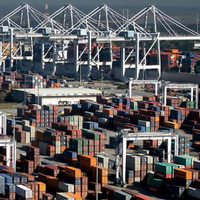

News
Not the Time to Pull Back from Global Economy

World Trade Day Preview: Now’s Not the Time to Pull Back from Global Economy
April 4, 2017 Trevor Williams
The keynote speaker for the upcoming World Trade Day summit in Atlanta May 2 believes that a significant pullback from the global economic system would harm the U.S. in far-reaching, unpredictable ways.
“It’s the water we swim in. The economy is global, and trade is entrenched in our economy and every other economy in deep ways,” said Matthew McGuire, former U.S. executive director of the World Bank Group and a former Commerce Department official.
Mr. McGuire will be the keynote speaker at an all-day conference in Atlanta featuring a wide array of discussions under the heading, “Trade Talk: Real Conversations About the Future of Global Trade.”
In a preview interview with Global Atlanta, Mr. McGuire said nationalist sentiments like President Donald Trump’s “America First” trade strategy might play well on the campaign trail, but they fail to take into account how deeply interwoven supply chains are around the world, Mr. McGuire said.
Disentangling from these relationships could affect American exports and hinder foreign investment, which sustains 5 million jobs in the United States.
He added that trade becomes an easy scapegoat for larger forces fostering uncertainty and displacing workers, including the use of automation in manufacturing, mass migration and freer flows of capital.
“You can’t vote against any of those things, but you can vote against a trade agreement. In many ways, these broader things get crystallized in trade,” Mr. McGuire said. “It gets lumped in too easily and people talk too broadly about trade as one monolithic thing,”
Those who beat up on trade also play on tropes that rely on incomplete or misleading information, he said.
Yes, America has a big trade deficit in goods with places like China, Mexico and Germany, but like many advanced economies, the U.S. is a net exporter of higher-value services, including higher education.
Yes, American manufacturing jobs declined during the latter half of the 20th century, and the country lost factories to Mexico after NAFTA and China after its entry into the World Trade Organization in 2001. But data show those trajectories were well on their way before the 1990s, as factories boosted productivity through technology investments over time.
And those saying “We don’t make anything anymore” are mistaken: The U.S. produces more manufacturing value than ever, just with fewer people and different kinds of factory jobs.
Finding solutions to real grievances around trade requires honest, non-political conversation and an understanding of how much the U.S. economy is affected by it, for better or worse, Mr. McGuire said. That’s what he hopes to foster at the May 2 event.
Mr. Trump won support across the Rust Belt especially by promising an American manufacturing renaissance.
Mr. McGuire noted that there’s merit to the criticisms leveled by the blue-collar workers that have been displaced. The U.S. must do a better job of retraining workers for future industries, with the federal government partnering with companies to scale successful programs.
“I don’t know if government and business have been collaborative enough to expand models that work,” he said.
These topics and more will be on the docket for the all-day event, which will include Mr. McGuire’s keynote speech, concurrent panel discussions on security, trends to attract investment and emerging markets in the morning.
That will be followed by a luncheon discussion on the NAFTA region, then afternoon roundtables on digital disruption, advanced manufacturing and energy solutions.
Speakers are to include:
Timothy Perman, global strategy director at Coca-Cola Co.
Gordon Giffin, former U.S. ambassador to Canada
Edward Alden, Bernard L. Schwartz senior fellow, Council on Foreign Relations
Gerry Horner, director, office of Technology Evaluation, Bureau of Industry and Security, U.S. Department of Commerce
…and more local and national speakers.
Visit www.worldtradeday.com to see the full list and agenda or to register. Tickets are $145 now until the day of the event, when the price goes up to $175. Corporate sponsorships are available.